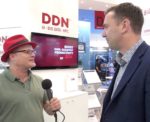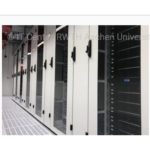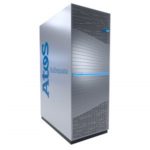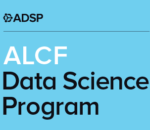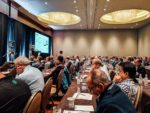SDSC has been awarded a five-year grant from the NSF valued at $10 million to deploy Expanse, a new supercomputer designed to advance research that is increasingly dependent upon heterogeneous and distributed resources. “As a standalone system, Expanse represents a substantial increase in the performance and throughput compared to our highly successful, NSF-funded Comet supercomputer. But with innovations in cloud integration and composable systems, as well as continued support for science gateways and distributed computing via the Open Science Grid, Expanse will allow researchers to push the boundaries of computing and answer questions previously not possible.”
Video: DDN Launches EXA 5 at ISC 2019
In this video from ISC 2019, James Coomer from DDN describes the company’s new EXA 5 advanced Lustre solution. “We’ve built EXA5 directly for the new era of HPC and AI in the context of Multicloud. We are introducing an entirely new set of features aimed at today’s most demanding AI and HPC end-to-end requirements, at any scale.” said James Coomer, senior vice president of products, DDN. “EXA5 leads on performance, on-prem and in the cloud, with unmatched capabilities in security, stability, user and data management.”
NEC Delivers HPC Cluster to RWTH Aachen University in Germany
Today NEC announced that RWTH Aachen University in Germany has started operations of a new HPC cluster. Called CLAIX-2018 the system augments the university’s existing CLAIX-2016 installation. “RWTH Aachen is one of the most renowned universities in Germany, and this project is a lighthouse project not only for the HPC datacentre, but also for NEC,” said Yuichi Kojima, Vice President HPC EMEA at NEC Deutschland.
NEXTGenIO Project Delivers Prototype to EPCC
The EPCC supercomputing centre at the University of Edinburgh has installed a prototype system developed by the NEXTGenIO project. Funded by the European Commission, NEXTGenIO is an R&D project tasked with developing solutions to high performance computing’s I/O and data challenges. “Our ongoing collaboration with NEXTGenIO allows us to develop solutions to speed up time-consuming I/O operations in HPC applications and workflows, leading to faster execution, less use of resources, and improved scalability,” said Trish Damkroger from Intel.
Atos to Deploy Most Powerful Supercomputer in Norway
Today Atos announced a 4-year contract to deliver a BullSequana XH2000 supercomputer to Uninett Sigma2, the national e-infrastructure provider in Norway. As the most powerful supercomputer in Norway, the AMD-powered system will provide researchers with an enhanced computing capacity to enable new innovation breakthroughs. “Norwegian researchers will have access to more than 5 times more capacity than previously, with a theoretical peak performance of 5.9 PetaFlops.”
Kmesh.io – Multicloud Lustre-as-a-Service
Vinay Gaonkar from Kmesh.io gave this talk at LUG 2019. “The need for cloud-based Lustre, he explained, is driven by both technological and business factors. In the end, this all adds up to a trend in which the cloud world is moving from heavy use of centralized data lakes to a much more flexible and responsive architecture of many smaller, distributed data ponds.”
Converging Workflows Pushing Converged Software onto HPC Platforms
Are we witnessing the convergence of HPC, big data analytics, and AI? Once, these were separate domains, each with its own system architecture and software stack, but the data deluge is driving their convergence. Traditional big science HPC is looking more like big data analytics and AI, while analytics and AI are taking on the flavor of HPC.
Call for Proposals: Get on Big Iron with the ALCF Data Science Program
The ALCF Data Science Program at Argonne has issued its Call for Proposals. The program aims to accelerate discovery across a broad range of scientific domains which require data-intensive and machine learning algorithms to address challenging research problems. “Ongoing and past ADSP projects span a diverse range of science domains, e.g. Materials, Imaging, Neuroscience, Engineering, Combustion/CFD, Cosmology; and involve large science collaborations.”
Preliminary Agenda Posted for HP-CAST at ISC 2019
Hewlett Packard Enterprise has posted their Structural Agenda for HP-CAST at ISC 2019. The event takes place June 14-15 in Frankfurt, Germany. “HP-CAST provides guidance to Hewlett Packard Enterprise on the essential development and support issues for HPC systems.”
Interview: Cray in Azure Steps up with Dedicated Supercomputing in the Cloud
In this interview, Joseph George from Cray describes the company’s new offerings for Cray in Azure. “The Cray and Microsoft Azure teams have been actively working on numerous customer engagements together, in an effort to clearly understand the optimal cloud model for large scale HPC workloads, and the best consumption model for HPC users. With all that research as a foundation, it has become clear to us that a dedicated and reserved instance cloud model allows for an ideal HPC experience at large scale.”


